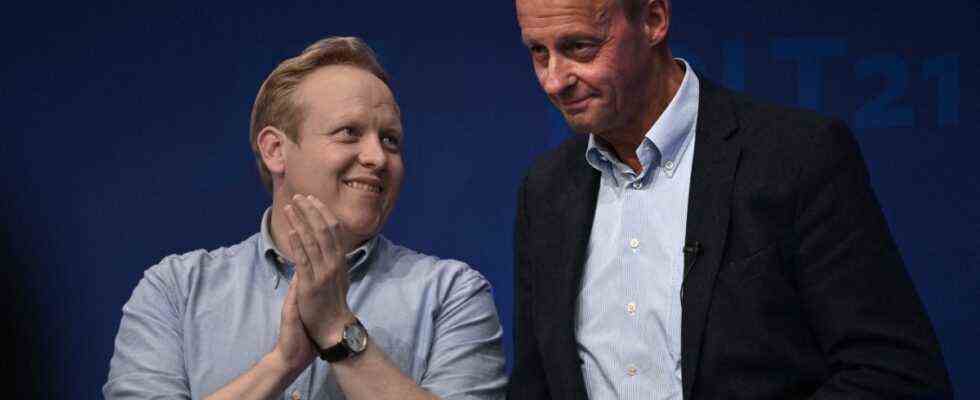The most popular word on Friday evening in Münster is “Aufbruch” three weeks after the Union’s defeat in the elections. 500 kilometers away in Berlin, the leaders of the Greens, SPD and FDP presented an exploratory paper on that day before entering into coalition negotiations. It looks like the Union ends up in opposition. The federal chairman of the Junge Union, Tilman Kuban, is now shouting into the microphone: “The new beginning of the CDU and CSU begins here at the Junge Union’s Germany Day in Münster.” The CDU and CSU youth organization describes its three-day meeting in North Rhine-Westphalia as a “big family reunion”. With almost 100,000 members, it is the largest political youth organization in Europe.
Thirty minutes later, Friedrich Merz came into the hall with loud clapping – “Love me again” boomed from the loudspeakers. The 300 or so young delegates clap and cheer for the 65-year-old from the Sauerland. Merz, well tanned, steps up onto the stage with a smile. John Newman now calls: “I need to know now, know now. Can you love me again?” Tilman Kuban is delighted to see the visit. “It’s a bit like two years ago,” he says and gently strokes Merz’s shoulder. Even back then, at the JU meeting in Saarland in 2019, Kuban and colleagues saw Merz as a conservative savior and the best candidate for chancellor.
For the Junge Union, departure and the appearance of the former parliamentary group chairman from 20 years ago are not mutually exclusive, even two years later. For Merz it is the third attempt to finally become party leader. But officially, it’s about him, too, of course, about new beginnings and renewal. Since still party leader Armin Laschet announced his slow-motion retreat, it has been clear that the JU meeting would also be a first mood test for potential successors. Kuban is pleased about the great interest on the first day of the three-day meeting: “The top-class people, the leaders of the Union will be with us because we are the engine.” Despite all the talk of a new beginning, five more or less well-known men from North Rhine-Westphalia are in the running for the Laschet successor: Friedrich Merz, Jens Spahn and Norbert Röttgen. As well as new in the possible personnel carousel: Union parliamentary group leader Ralph Brinkhaus and Carsten Linnemann, the head of the SME association. They all find time to speak a greeting at the JU – only CSU boss Markus Söder canceled at short notice.
“Experienced a political earthquake”
The Union is “shitty” three weeks after the election, Kuban said. “We experienced a political earthquake because we behaved like a chicken pile.”
Merz, currently Vice President of the Economic Council of the CDU, also finds pithy words for the defeat of his party: “With this election result, the Union has become a serious political restructuring case that is threatened with insolvency.” He wanted to deal with the question, so Merz: “How do we actually get out of there? We should answer the question, what can only we do that the others cannot?”
Merz, who is generally considered a good speaker, does not reach his audience that evening – he will still get minutes of applause. But this speech is qualitatively far from the one he gave some time ago as an application speech to the Sauerland CDU. For the people in Germany, Merz thinks, one topic is even more important than climate change: social justice. New social security systems are needed for an aging society, according to Merz. He recalls a proposal “which we discussed at a party congress back in 2003”. He thinks it is astonishing that the first-time voters in this federal election mainly voted for the FDP and the Greens. “Obviously, the concept of freedom is currently better with the Greens and the FDP than with us,” says Merz. Therefore, the Union has to reinvent itself again. “Now is not the time for parties, this is the time for a serious political argument – even if the first bottle of beer is already circling back there,” warns Merz after a look at the podium.
Of course, it depends on who will lead the Union in the future, says Merz, but it’s not about a person, but about a good management team: “Let me make a final remark:” Young brooms sweep well, but the old brush knows them Corners. “
After the applause, a delegate asks Merz: “How do we manage to set more young topics and not become an old man’s party?” Merz ponders, then says: “We have to be interesting.” Another delegate asks whether he will be available again for the CDU chairmanship. Merz replies that he has not yet made up his mind.

